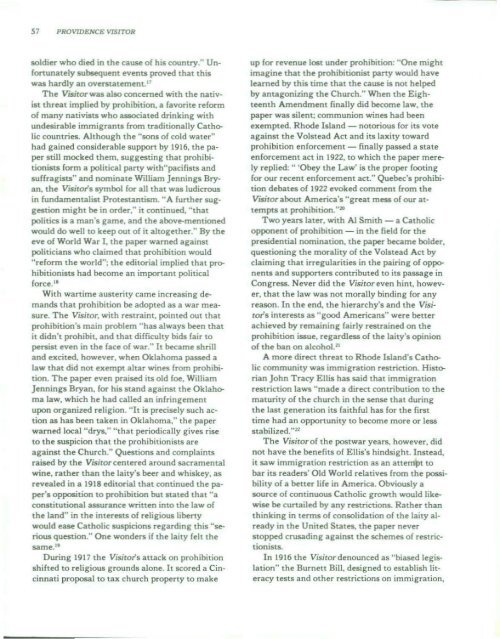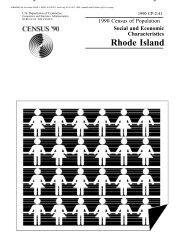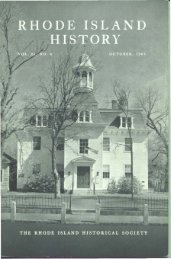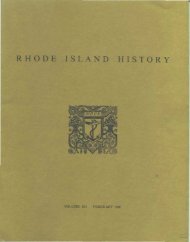RHODE ISLAND HISTORY - Rhode Island Historical Society
RHODE ISLAND HISTORY - Rhode Island Historical Society
RHODE ISLAND HISTORY - Rhode Island Historical Society
- No tags were found...
You also want an ePaper? Increase the reach of your titles
YUMPU automatically turns print PDFs into web optimized ePapers that Google loves.
57 PROVIDENCE VlSlTORsoldier who died in the ca use of his country," Unfortunatelysubsequent events proved that thiswas hardly an oversta tement. nThe Visitor was also concerned with the nativistthreat implied by prohibition, a favorite reformof many nativists who associated drinking withundesirable immigrants from traditionally Catholiccountries, Alt hough the "sons of cold water"had gained considerable support by 1916, the paperstill mocked them, suggesting that prohibitionistsform a political party with"pacifists andsuffragists" and nominate William jennings Bryan,the Visitors symbol for all tha t was ludicrousin fundamentalist Protestantism...A further suggestionmight be in order:' it continued, "thatpolitics is a man's game, and the above-mentionedwould do well to keep out of it alt ogether." By theeve of World War I, the paper warned againstpoliticians who clai med that prohibition would"reform the world"; the editorial implied that prohibitionistshad become an important politicalforce ."With wartime austerity came increasing demandsthat prohibition be adopted as a war measure,The Visitor, with restraint, pointed out thatprohibition's main problem "has always been thatit didn't prohibit, and that difficulty bids fair topersist even in th e face of war." It became shrilland excited, however , when Oklahoma passed alaw that did not ex empt altar wines from proh ibition.The paper even praised its old foe, Williamjennings Bryan, for his stand against the Oklahomalaw, which he had called an infringementupon organized religion. "It is precisely such actionas has been taken in Oklahoma," the paperwarned local "drys," "that periodically gives riseto the suspicion that the prohibitionists areagainst the Church." Questions and complaintsraised by the Visitor centered around sacramentalwine, rather than the laity's beer and wh iskey, asrevealed in a 1918 editorial that continued the paper'sopposition to prohibition but stated that "aconstitutional assurance written into the law ofthe land" in the interests of religious libe rtywould ease Catholic suspicions regarding this "seriousquestion." One wonders if the laity felt thesame."During 1917 the Visitors attack on prohibitionshifted to religious grounds alone. It scored a Cincinnatiproposal to tax church property to makeup for revenue lost under prohibition: "On e mightima gine that the prohibitionist party would havelearned by this time that the cause is not helpedby antagonizing the Church." When the E ighteenthAmendment finally did become law, thepaper was silent; communion wines had beenexempted. <strong>Rhode</strong> <strong>Island</strong> - notorious for its voteagainst the Volstead Act and its laxity towa rdprohibition enforce ment - finally passed a stateenforcement act in 1922, to which the paper merelyreplied: " 'Obey the Law' is the proper footingfor our recent enforcement act." Quebec's prohibitiondebates of 1922 evoked comment from theVisirorabout America's "great mess of ou r attemptsat prohibition."·Two years later, with Al Smith - a Catholicoppon ent of prohibition - in the field for thepresidential nomination, the paper became bolder,questioning the morality of the Volstead Act byclaiming that irregularities in the pairing of opponentsand supporters contributed to its passage inCongress. Never did the Visitor even hint, however,that the law was not morally binding for anyreason. In the end, the hierarchy's and the Visiror'einterests as "good Americans" were betterachieved by remaining fairly restrained on theprohibition issue, regardless of the laity's opiniono f the ban on alcohol."A more direct threat to <strong>Rhode</strong> <strong>Island</strong> 's Catholiccommunity was immigration restriction. Historianjohn Tracy Ellis has said that immigrationrestriction laws "made a direct contribution to thematurity of the church in the sense that duringthe last generation its faithful has for the firsttime had an opportunity to become more or lessstabilized.v"The Visiror of the postwar years, however, didnot have the benefits of Ellis's hindsight. Instead,it saw immigration restriction as an attempt toba r its readers' Old World relatives from the possibilityof a better life in America . Obvi ously asource of continuous Catholic growth would likewisebe curtailed by any restriction s. Ra ther thanthink ing in tenns of consolidation of the laity alreadyin the United States, th e paper neverstopped crusading against the schemes of restrictionists.In 1916 the Visirordenounced as "biased legislation"the Burnett Bill, designed to establish literacytests and other restrictions on immigr ation,











